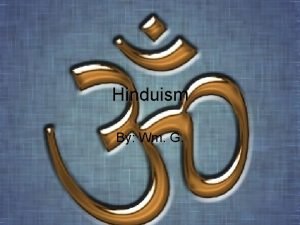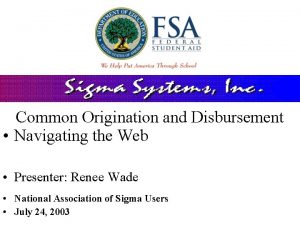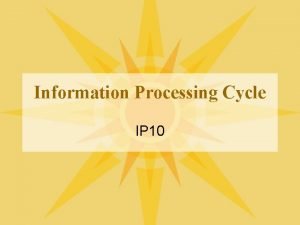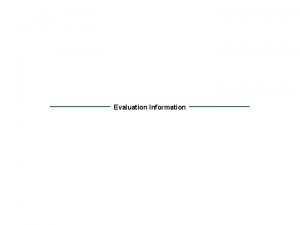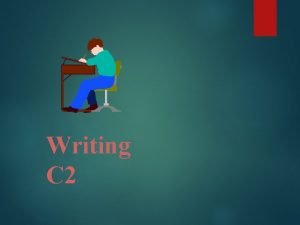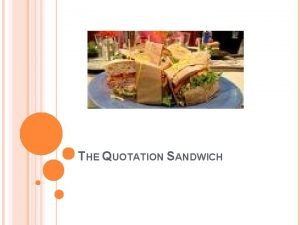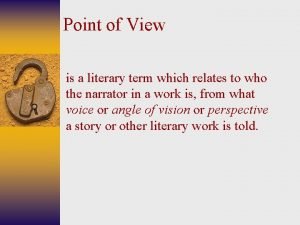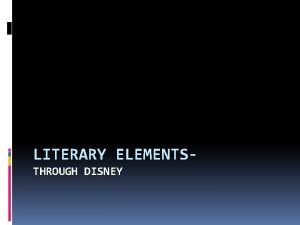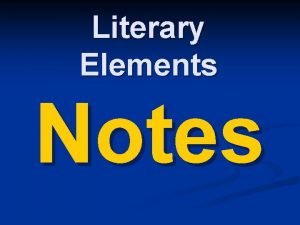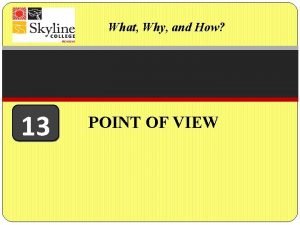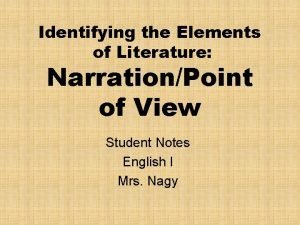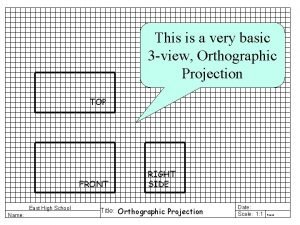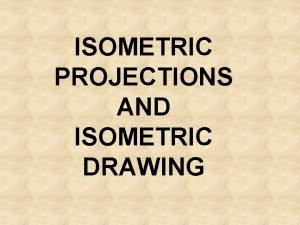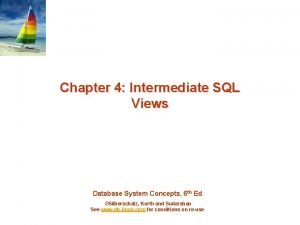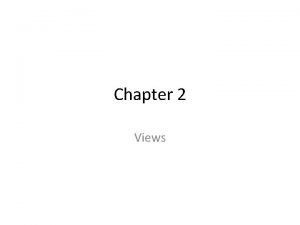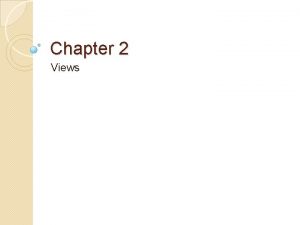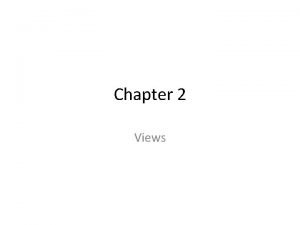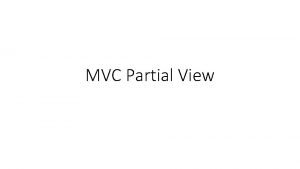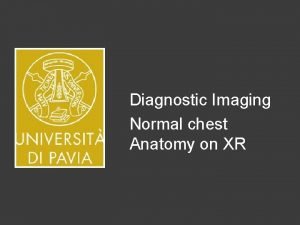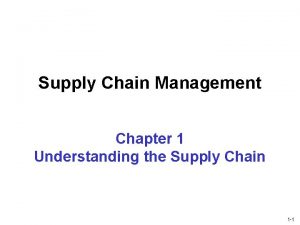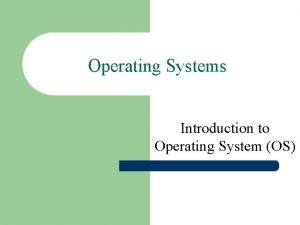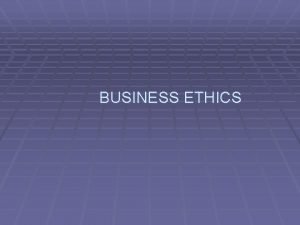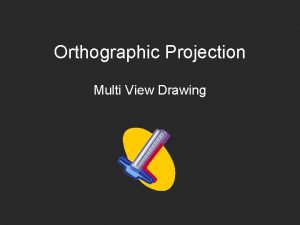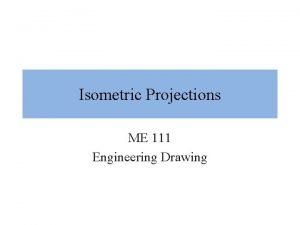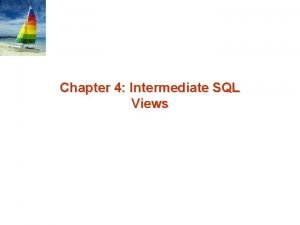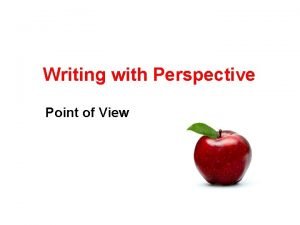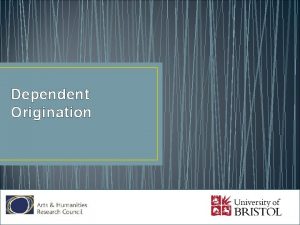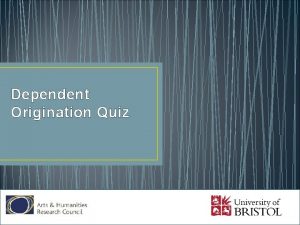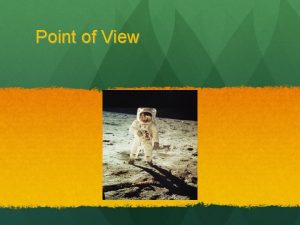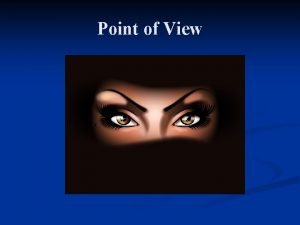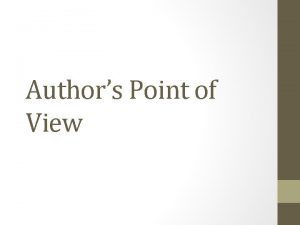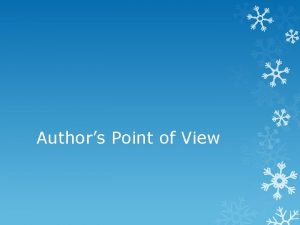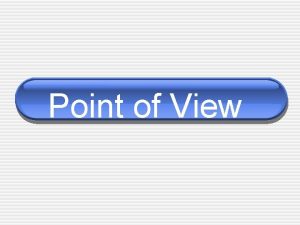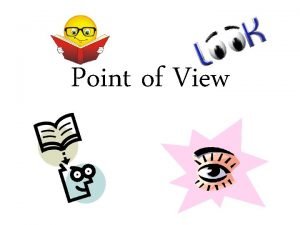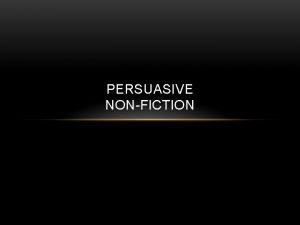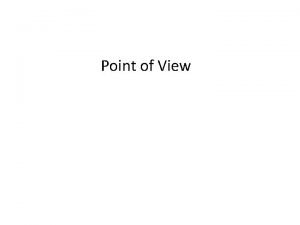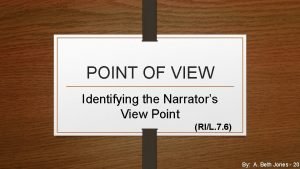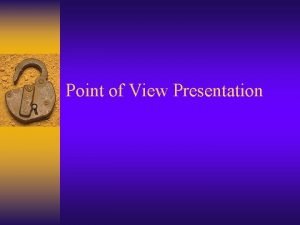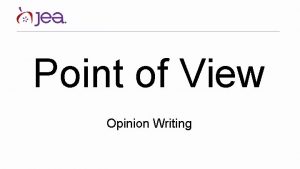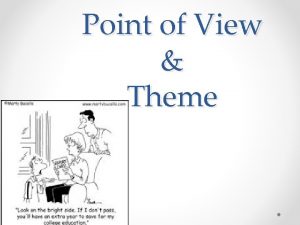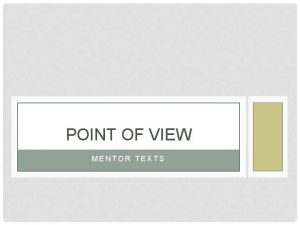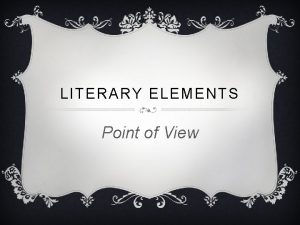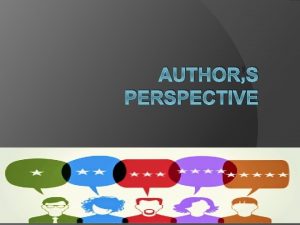POINT of VIEW Z J OUTLINE Definition Origination



































- Slides: 35

POINT of VIEW Z. J.

OUTLINE: § Definition: § Origination: § 1 st Person, 2 nd Person, 3 rd Person POV § POV in “Araby”

WHAT IS POV? Wordnet; Princeton Edu: § • Point of view, viewpoint, standpoint (a mental position from which things are viewed) Merriam-Webster Dictionary: § • Pov: a position or perspective from which something is considered or evaluated American Heritage Dictionary: § • • a position from which something is observed or considered; a stand point the attitude or outlook of a narrator or character in a piece of literature, a movie, or another art form

DEFINITION: § Point of View (POV) in story: The perspective from which an author lets the reader view the action of the narrative; in other words, the ‘who’ who is telling the story.

ORIGINATION § A story is always a narrative in some way or another, and thus it involves an agent who narrates what happens in the story. Author Audience Narrator

ORIGINATION § The narrator is the speaker or the voice of the literary text, the agent who does the narration. • E. g. Wuthering Heights Mr. Lockwood; Nelly servant It is the narrator that represents the principles of judgment. The author expresses his/her ideas and attitude through the narrator.

ORIGINATION § Percy Lubbock. (The Craft of Fiction, 1957. ) • The term has two senses. • First, it resembles the point of vision in visual arts, from which angle and at which position the spectator looks at an object under observation. • the POV the narrator adopts is a cue for the reader to discern his/her attitude.

1 st Person, 2 nd Person, 3 rd Person POV § § § 1 st Person POV 2 nd Person POV 3 rd Person POV • Omniscient, • Limited Omniscient, • Objective

1 st Person POV § I, me, my, we, our…

First person Narrator § Uses “I” § Story is told from a major or minor character’s POV

First person Narrator Benefits: § Readers see events from the perspective of an important character § Readers often understand the main character better

First person Narrator Detriments: § The narrator may be unreliable— insane, naïve, deceptive, narrow minded etc. . . § Readers see only one perspective

First person Narrator § True--nervous--very, very dreadfully nervous I had been and am; but why will you say that I am mad? The disease had sharpened my senses--not destroyed--not dulled them. Above all was the sense of hearing acute. I heard all things in the heaven and in the earth. I heard many things in hell. How, then, am I mad? Hearken! and observe how healthily--how calmly I can tell you the whole story. --Edgar Allan Poe, “The Tell-Tale Heart” (1850)

2 nd Person POV § You, yours, yourself

2 nd Person POV § A second-person POV is rare § Uses “you” and presents commands § Often the narrator is speaking to him/herself

2 nd Person POV § You are not the kind of guy who would be a place like this at this time of the morning. But here you are, and you cannot say that the terrain is entirely unfamiliar, although the details are fuzzy. You are at a nightclub talking to a girl with a shaved head. The club is either Heartbreak or the Lizard Lounge. All might come clear if you could just slip into the bathroom and do a little more Bolivian Marching Powder. Then again, it might not. --Jay Mc. Inerney, Bright Lights, Big City (1984)

3 rd Person POV Omniscient, Limited Omniscient, Objective

3 rd Person POV: Omniscient § Omniscient = all knowing…the narrator can see into the minds of all characters

3 rd Person POV: Omniscient: § he/she can enter character's minds and know everything that is going on, past, present, and future. § May be a narrator outside the text

3 rd Person POV: Omniscient §Advantage § very natural § technique; author is, after all, omniscient regarding his work.

3 rd Person POV: Omniscient § Disadvantage: § not lifelike; § narrator knows and tells all; is truly a convention of literature

3 rd Person POV: Omniscient § “It was the best of times, it was the worst of times, it was the age of wisdom, it was the age of foolishness, it was the epoch of belief, it was the epoch of incredulity, it was the season of Light, it was the season of Darkness, it was the spring of hope, it was the winter of despair, we had everything before us, we had nothing before us, we were all going direct to Heaven, we were all going direct the other way--in short, the period was so far like the present period, that some of its nosiest authorities insisted on its being received, for good or for evil, in the superlative degree of comparison only. ” § --Charles Dickens, A Tale of Two Cities (1859)

3 rd Person POV: Limited Omniscient § Narrator can see into ONE character’s mind.

3 rd Person POV: Limited Omniscient § All characters have thought privacy except ONE.

3 rd Person POV: Limited Omniscient § Gives the impression that we are very close to the mind of that ONE character, though viewing it from a distance.

3 rd Person POV: Limited Omniscient § Sometimes this narrator can be too focused or may impose his/her own opinions with no grounds.

3 rd Person POV: Limited Omniscient § The girl he loved was shy and quick and the smallest in the class, and usually she said nothing, but one day she opened her mouth and roared, and when the teacher--it was French class--asked her what she was doing, she said, in French, I am a lion, and he wanted to smell her breath and put his hand against the rumblings in her throat. --Elizabeth Graver, “The Boy Who Fell Forty Feet” (1993)

3 rd Person POV: Objective § Narrator only describes and does not enter characters’ thoughts.

3 rd Person POV: Objective § Like a video camera, the narrator reports what happens and what the characters are saying.

3 rd Person POV: Objective § The narrator adds no comment about how the characters are feeling.

3 rd Person POV: Objective § The narrator offers no comment on the mood of the setting—no mention of awkwardness, ease, tension etc. . .

3 rd Person POV: Objective § The morning of June 27 th was clear and sunny, with the fresh warmth of a full-summer day; the flowers were blossoming profusely and the grass was richly green. The people of the village began to gather in the square, between the post office and the bank, around ten o’clock; in some towns there were so many people that the lottery took two days and had to be started on June 26 th, but in this village, where there were only about three hundred people, the whole lottery took less than two hours, so it could begin at ten o’clock in the morning and still be through in time to allow the villagers to get home for noon dinner. --Shirley Jackson, “The Lottery” (1948)

POV in “Araby” § The former tenant of our house, a priest, had died in the back drawing-room. Air, musty from having been long enclosed, hung in all the rooms, and the waste room behind the kitchen was littered with old useless papers. Among these I found a few paper-covered books, the pages of which were curled and damp: The Abbot, by Walter Scott, The Devout Communicant, and The Memoirs of Vidocq. I liked the last because its leaves were yellow. The wild garden behind the house contained a central apple-tree and a few straggling bushes, under one of which I found the late tenant’s rusty bicycle-pump. He had been a very charitable priest; in his will he had left all his money to institutions and the furniture of his house to his sister.

REFERENCE § Elements of a Story, Ray Lapoint § Approaching Fiction, 袁宪军, 钱坤强, Peking University Press, 2006 § http: //www. authorstream. com/presentation/tccampa 153011 -point-view-literature-fiction-education-pptpowerpoint § http: //iclass. shufe. edu. cn/teacherweb/users/earnest/ jfarticle 2/news. asp? id=237#alabi § http: //wordnet. princeton. edu/ § http: //www. merriam-webster. com/

The End Thank You!
 Hinduism
Hinduism Loan origination best practices
Loan origination best practices Common origination and disbursement
Common origination and disbursement Local origination programming
Local origination programming Information process cycle
Information process cycle Acaps loan origination system
Acaps loan origination system Common origination and disbursement
Common origination and disbursement Essay writing c
Essay writing c What is sentence outline
What is sentence outline Naive narrator
Naive narrator Foil character definition
Foil character definition Elements of literature definition
Elements of literature definition I is what point of view
I is what point of view Narrative definition literature
Narrative definition literature 5 paragraph essay format
5 paragraph essay format The top view is directly above the right side view
The top view is directly above the right side view Under what conditions, a sectional view is preferred?
Under what conditions, a sectional view is preferred? Section view adalah
Section view adalah Half section views
Half section views Ant birds eye view
Ant birds eye view Glassbox model
Glassbox model Front view isometric
Front view isometric For the view create view instructor_info as
For the view create view instructor_info as Simple view and complex view
Simple view and complex view Simple view and complex view
Simple view and complex view Simple view and complex view
Simple view and complex view @html partial
@html partial Ap view vs pa view
Ap view vs pa view Scm cycle view
Scm cycle view Os components
Os components The unitarian view in business ethics
The unitarian view in business ethics Multiview orthographic projection
Multiview orthographic projection Front view top view
Front view top view Isometric view of prism
Isometric view of prism For the view create view instructor_info as
For the view create view instructor_info as Second person clue words
Second person clue words
